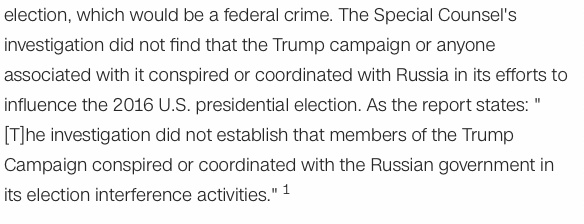You have /5 articles left.
Sign up for a free account or log in.
I did not plan on publishing a blog post today, because while I had something ready to go, the release of the redacted version of the Mueller Report seems poised to dominate another full day of public discourse, and I figured anything I wrote here would get lost in the flow of current events.
That is until I read a short article at Talking Points Memo illustrating the difference between a direct quote as it appeared in Attorney General Bill Barr’s earlier letter characterizing the report and its full context in the report itself.
Here is an excerpt from Barr’s letter, as reproduced at CNN.com.

I did not make note of it at the time, but we should’ve been suspicious of that [T] at the start of the direct quote, an indication that punctuation has been altered from the original in order to make sense in the letter. It strongly suggests there was another (likely dependent) clause attached to the front of that independent clause.
It could’ve been any number of things, for instance: “While the investigators turned over every rock and examined every nook and cranny in an unprecedentedly thorough effort wholly supported by the President and his entire cabinet and staff, the investigation did not establish that members of the Trump Campaign conspired or coordinated with the Russian government in election results.”
As I tell my college freshman in discussing dependent clauses, we call the dependent clauses because they “depend” on the independent clause in order to achieve grammatical correctness. At the same time, the independent clause depends on the dependent clause for its full meaning. The dependent clause enhances and qualifies the independent clause. They are truly dependent on each other.
As we know, the dependent clause was different than my hypothetical. The entire quote read, in context, “The investigation also identified numerous links between the Russian government and the Trump Campaign. Although the investigation established the Russian government perceived it would receive a benefit from a Trump presidency and worked to secure that outcome, and the Campaign expected it would benefit electorally from information stolen and released through Russian efforts, the investigation did not establish that members of the Trump Campaign conspired or coordinated with the Russian government in its election interference activities.”
A little different meaning in context, yes?
I have seen this kind of move before by college students who are trying to shoehorn a source into a researched essay where the source doesn’t quite fit. A well placed ellipses here, a dependent clause snipped there and all of the sudden just the right little nugget slides into place. One of the reasons we writing instructors require citations is so we can check up on the accuracy of a student’s use of sources.
When students do this it’s usually born out of a defect in the writing process where they have locked into a thesis, and rather than allowing the writing and sources to guide their thinking along the way as we value in academic scholarship and discourse, they shave off a square peg until it (sort of) fits into a round hole. Often, this technique has worked in the past as they’ve been rewarded for producing artifacts that merely need to look like they are using the moves of sound critical thinking and writing, rather than being the genuine article.
This is one of the reasons I teach writing as a process of thinking. An important part of the writer’s practice is to develop the ability to be shaped by the writing itself and to recognize when one must alter their thinking.
Barr got away with it, temporarily anyway, because we did not yet have access to the source he was citing. The report’s language is plain. It declares that the Russian government engaging in interference with the United States electoral system and the Trump campaign were acting in tandem, though not in concert, not in such a way as to rise to a clear case of conspiracy.
Surely he knew that eventually the mischaracterization would be discovered, but by that time, the water would be sufficiently muddied for those who don’t pay such close attention to throw up their hands and declare that we can never know the truth, so why bother?
But we can know the truth. It’s there in the words.





